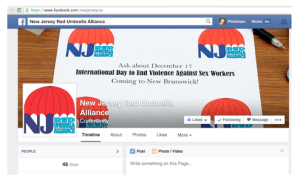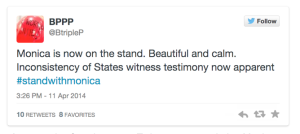In 2015, Jill McCracken prepared for a TEDx talk on the topic “Selling Sex: Contradicting Violence with Choice” amassing a great deal of the current research on the topic. Later in 2015 Jill joined BPPP’s research advisory committee for the Nothing About Us, Without Us Project, and these references and summaries proved to be an extremely valuable resource as we developed our work on HIV policy and sex worker rights. She has now kindly provided us with a comprehensive blog posting collating key research summaries. We are publishing her post in two parts, the first focusing on the intersections of sex work, HIV and health, and the second part will focus on references referencing trafficking in persons. Jill is an Associate Professor of Rhetoric and Writing Studies at the University of South Florida St. Petersburg and author of the book Street Sex Workers Discourse.
Navigating the References Connecting Sex Work, Criminalization, and Violence
By Jill McCracken, PhD
You may not learn a great deal of new information in this blog. I say that truthfully and also to acknowledge the incredible work that has and continues to be done and shared within the sex worker rights movement and beyond. As I was compiling these sources and writing the blog, explained more fully below, I was continually hearing myself say, “Well, this is nothing new. This is what we have been saying all along”. And yet, because sources are making this information known through case studies, sites of analysis, research methodologies, and community organizations and perspectives, it becomes extremely helpful to reiterate this information and put it in one place for easy reference; at least it has been helpful for me.
When I found out I was going to give a TEDx talk at the University of South Florida, I was instantly terrified. My terror is usually linked to not only my high expectations for myself, but also my fear of disappointing my audience. And when I considered my fear in relationship to this project (working through my fear has become my new way of being of late), I realized the audience I was most afraid of disappointing was my sex worker and sex worker rights colleagues and organizations. I also knew that in order to give a talk that was worthy of the subject matter: A World Beyond Ourselves, I would need to, once again, rely on my sex worker and sex worker rights colleagues and friends. I therefore went to my many online lists and organizations and asked for help. I also did a great deal of research. Ironically, most, if not all, of this research did not actually make it into the talk, because I later found out that TEDx talks were not meant to include lots of statistics and facts, but rather stories and information the audience can relate to. But what I did find in doing all of that research was that I became even more convinced of my (and many others’) central idea for this talk: that sex work must be decriminalized if we are to reduce violence against sex workers, sex workers must be at the forefront of any discussions about these policies, and that we must focus on a rights-based approach rather than a prosecution or criminal-based approach.


